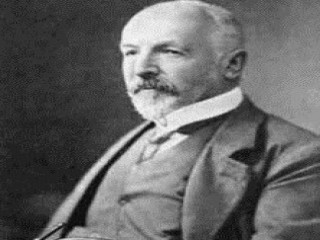
Georg Cantor biography
Date of birth : 1845-03-03
Date of death : 1918-01-06
Birthplace : St. Petersburg, Russia
Nationality : German
Category : Science and Technology
Last modified : 2011-05-26
Credited as : Mathematician, infinity of infinities,
The German mathematician Georg Ferdinand Ludwig Philipp Cantor was noted for his theory of sets and his bold analysis of the "actual" infinite, which provoked a critical examination of the foundations of mathematics and eventually transformed nearly every branch.
Georg Cantor was born in St. Petersburg, Russia, on March 3, 1845. He was German only by tenure. His father was a Danish Jew who converted to Protestantism and made his fortune in merchandising; his mother was a Roman Catholic whose family was richly endowed with musicians and artists. The Cantor family moved to Frankfurt, Germany, when Georg was 11. When he entered the Wiesbaden gymnasium at the age of 15, his mathematical talent was already evident.
In 1862 Cantor entered the University of Zurich. After a year he transferred to Berlin, where he studied mathematics and received his doctorate in 1867. Two years later he joined the faculty of the University of Halle as a privatdozent, or unpaid lecturer, and in 1872 he was appointed assistant professor. He married Vally Guttman in 1874, and they had six children.
Up to this time Cantor's mathematical work was uniformly excellent but with no harbinger of the explosive things to come. Then, while pursuing a problem on trigonometric series originally raised by Georg Riemann, he was led to investigate the nature of infinite sets of numbers. Fascinated by what he saw and driven almost against his will, he dug deeper and came up with some outrageously paradoxical results. Among other things, he proved that the number of points within a square is no more "numerous" than the number of points on one of its sides. "I see it but I don't believe it," he wrote to a friend in 1877. Neither did many others, and some were quick to say so. Leopold Kronecker attacked Cantor personally and used his prestige to prejudice others against Cantor's ideas. What made these ideas so pernicious in Kronecker's eyes was Cantor's insistence on treating infinite sets as completed entities.
Cantor developed his theory of sets and transfinite numbers in a long series of papers from 1874 to 1897. In 1879 he was promoted to full professor, and after a time his work came to be appreciated by some mathematicians. But the general hostility caused him to suffer frequent nervous breakdowns and long periods of depression. In 1908 even the great Henri Poincare remarked that later generations would regard Cantor's set theory "as a disease from which one has recovered." Poincare was wrong. Today the power of set theory to illuminate and unify vast areas of mathematics is generally recognized.
Cantor died on Jan. 6, 1918, in a mental hospital at Halle.
















